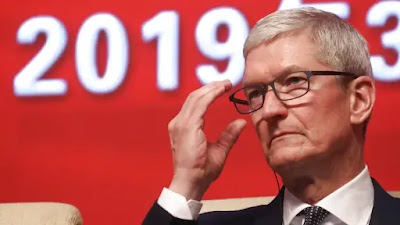
- Lawmakers on a three-day visit to California heard from prominent tech and media executives about their experiences working and competing in China.
- Over the course of three days, scheduled meetings included Disney, Apple, Google, Microsoft, Palantir, and Scale AI executives.
- This visit highlighted the crucial role that the tech and media sectors play in America's intricate relationship with China.
Prominent tech and media executives shared their experiences of working in and competing with China with lawmakers during their visit to California this week.
The House Select Committee on the Strategic Competition Between the United States and China sent a delegation of approximately 10 members to the West to meet with industry leaders and experts on critical areas of concern regarding China.
During the three-day visit that commenced on Wednesday, lawmakers had planned meetings with Disney CEO Bob Iger and Apple CEO Tim Cook, in addition to top-level executives from Google, Microsoft, Palantir, and Scale AI. The agenda also included engagements with a set of screenwriters, producers, and former studio executives with experience working with China, venture capitalists, and experts from Stanford University, according to a source familiar with the committee's activities.
The trip highlights how the tech and media sectors are essential in America's increasingly complex relationship with China and include that these industries depend on the country's extensive audiences and labor, concerns around human rights, free speech, and supply chain risks arise due to the government's censorship controls.
This trip comes after a historic meeting in California on Wednesday between House Speaker Kevin McCarthy, R-Calif., and Taiwanese President Tsai Ing-wen. The China leadership was angered by the meeting, which received praise from former Speaker Nancy Pelosi, D-Calif. The Chinese government denounced the meeting as a "provocation" and promised to take "resolute actions."
In Hollywood, the lawmakers from the select committee were informed about different aspects related to competing with China. As per a source aware of the committee's activities, creative content censorship was a key point of discussion during their meeting with Disney's Iger and a dinner with studio executives, whose names were not disclosed. The executives talked about navigating self-censorship to avoid upsetting the Chinese government even before filming, as well as edit requests they receive from the government to show films in the country.
On Thursday, in Silicon Valley, Microsoft President Brad Smith gave a presentation on artificial intelligence, cautioning that there is a slight difference between the U.S. and China in the progress of generative AI, a popular technology used in tools like ChatGPT, according to the source. He also talked about the mining and processing of rare earth minerals, which are crucial components in some tech devices. Smith and executives from Google, Palantir, and ScaleAI participated in a luncheon with committee members.
According to Steve Blank, a founding member of the Gordian Knot Center for National Security Innovation, lawmakers also had meetings with experts from Stanford University, including those from the center. Blank communicated the necessity of a defense strategy that entails more public-private partnerships across various industries to bring the U.S. on par with China in a phone call after the discussion on Thursday. Blank expressed admiration for the bipartisanship and interest shown by lawmakers in attendance.
Blank said that the lawmakers' questions showed their intelligence and bipartisan focus on the issues at hand, making him proud to be an American. He noted that they displayed a clear understanding of the topics discussed and a commitment to improving the country.
According to Rep. Ro Khanna, D-Calif., a committee member who represents Silicon Valley, it's important for lawmakers to spend time learning about cutting-edge technologies like AI, quantum computing and climate tech to better understand how to regulate and encourage them, and he was excited for his colleagues to visit his home district.
The aim of the trip, as described by Khanna and others, is to gather facts. Lawmakers intend to learn from industry executives during the meetings, and the conversations may inform future policymaking and hearings.
On Thursday, the committee also had plans to meet with venture capitalists, including those from Andreessen Horowitz, Khosla Ventures, and SV Angel. Khanna anticipated that the VCs would talk about how the government could collaborate more effectively with the private sector to remain competitive with China in areas of emerging technology.
The committee's plans involved a discussion on cryptocurrency with experts at Stanford on Friday, followed by a meeting with Cook at Apple's headquarters in Cupertino, as per the source familiar with the matter.
Khanna expressed his anticipation that the policymakers would receive updates from business leaders regarding their efforts to expand their supply chains beyond China and how they leverage their export income from China to invest in the US. Moreover, during the meeting with Apple's CEO, Khanna expects to have a candid conversation about supply chain issues, including the complexities involved in diversifying production away from China.
Stevens stated that in her opinion, every meeting has been focused on Michigan's economy and the country's manufacturing capabilities. As a manufacturing advocate with an understanding of the relationship between manufacturing and technology, she is focused on exploring ways to encourage and promote industrial policy in the United States. She cited the Chips and Science Act as an example of incentivizing domestic semiconductor manufacturing.
Stevens mentioned that, in addition to chips, they are examining other areas of supply chain vulnerabilities and deficiencies that could have an impact on the economy. She stated that they intend to maintain competitiveness in the fields of quantum and artificial intelligence.





0 Comments